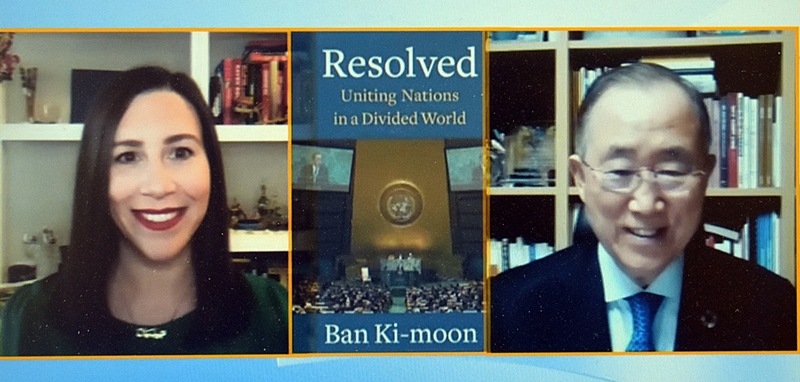Former UN leader Ban Ki-moon calls for ‘global citizens’ to cooperate more closely

Former United Nations Secretary-General Ban Ki-moon called for a return to multilateral diplomacy and for people to be “global citizens” during a National Press Club Virtual Headliners Book Event on Thursday.
In a discussion coinciding with the release of his new book “Resolved: Uniting Nations in a Divided World,” Ban said global alliances have fractured amid the crises of coronavirus, climate change and refugees fleeing conflict. And he blamed world leaders for not doing enough.
“Why are we not doing more and better? For me, the fault most often lies with the leaders of the world,” Ban said. “Too many autocrats and also dictators put themselves before their countries and before the people who elected them.”
That fracturing of global alliances undermined the world’s response to COVID-19, especially when the United States chose to withdraw from the World Health Organization, a move Ban called “totally unacceptable.” And he said the richest countries “looked inward first,” meaning an uneven distribution of vaccines.
The recent G7 summit in the United Kingdom gave Ban limited reasons for optimism, however, as leaders there agreed to share 1 billion doses with poorer countries and reaffirmed their pledge of $100 billion a year for poorer countries to help them fight climate change.
But he criticized the United States, which under the Trump administration stepped back from the global fight against climate change and withdrew from the Paris climate accord, for not stepping up earlier.
“This kind of leadership has shown no concern to the people, and it is only the people on the ground who will suffer,” Ban said. “This is what I found heartbreaking.”
Ban served as UN Secretary-General from January 2007 to December 2016. His tenure coincided with numerous incidents, including the Arab Spring, nuclear proliferation in Iran and North Korea, the Ebola epidemic, and brutal new conflicts in Central Africa.
And he said the UN could do more to help, especially in Syria, which has struggled for a decade amid civil war and a humanitarian crisis. Ban said it is paralyzed and unable to “deliver timely and effective and powerful messages or actions because of the divisions among the Security Council members, particularly veto-power members.”
Multilateralism has borne good work in recent years, Ban said, especially in getting 196 signatories for the Paris climate accord and adopting the UN’s 17 Sustainable Development Goals. But he said there is “so much work ahead,” not only in fighting climate change but also promoting peace in Myanmar, Afghanistan, Israel and elsewhere.
Ban served as UN Secretary-General from January 2007 to December 2016. His tenure coincided with numerous incidents, including the Arab Spring, nuclear proliferation in Iran and North Korea, the Ebola epidemic, and brutal new conflicts in Central Africa.
And Ban, who served as a South Korean diplomat and foreign minister before becoming the UN’s eighth Secretary-General, said his home country showed what is possible. Ban recalled being raised during the Korean War, then coming of age and watching the country grow from a dictatorship to a “stable and prosperous democracy.”
“Without the United Nations, Korea would not be as she is today,” Ban said.
